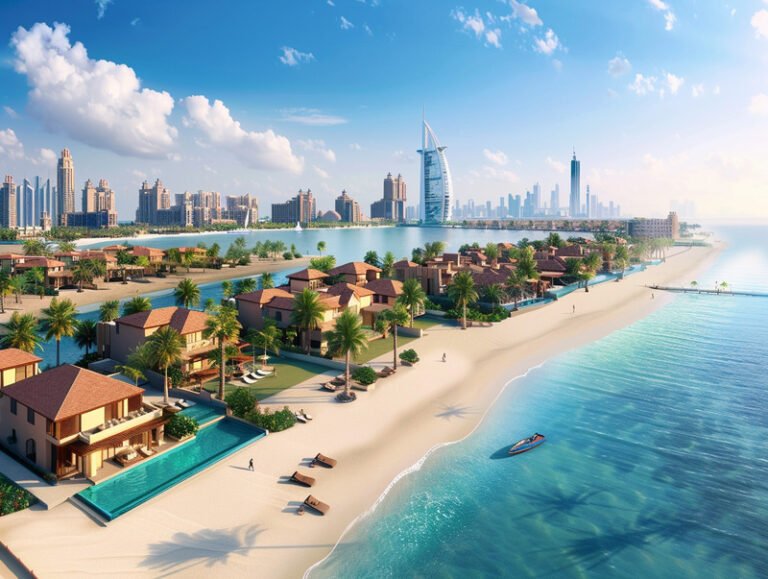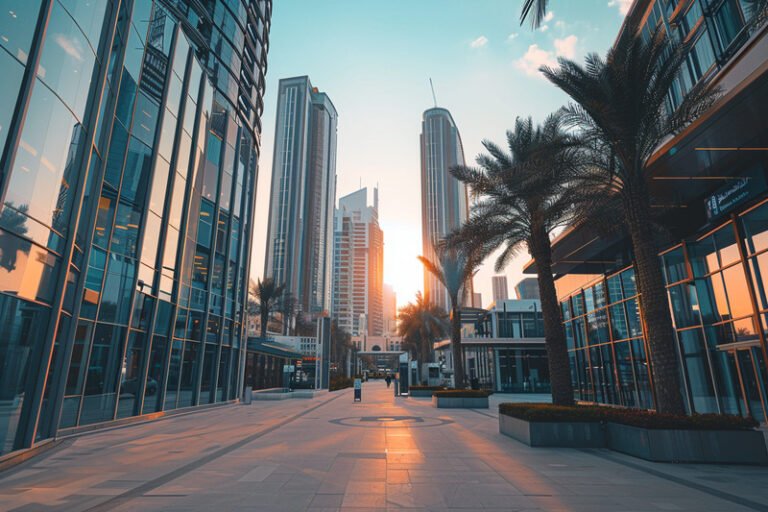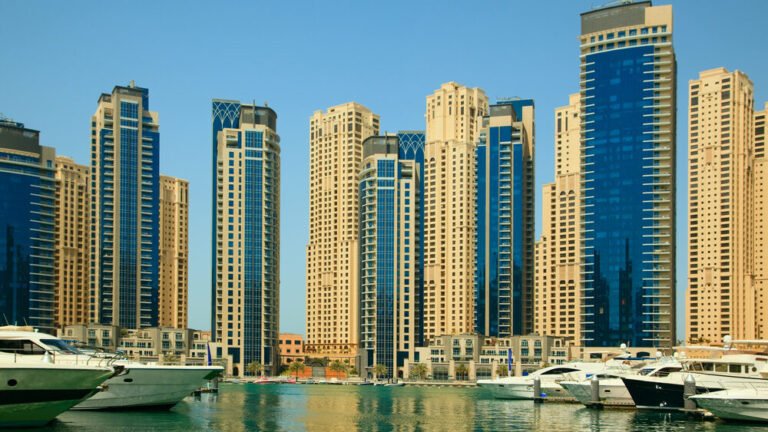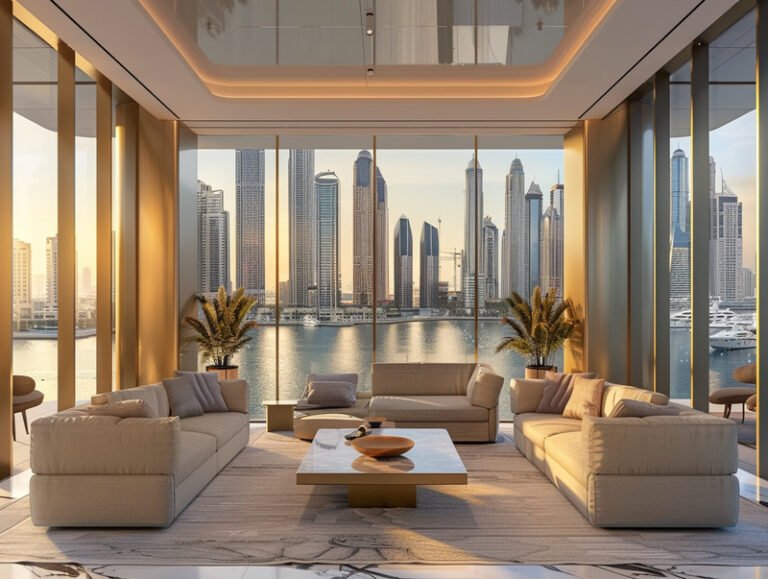Considerations for Non-Resident Indians Buying Property in Dubai
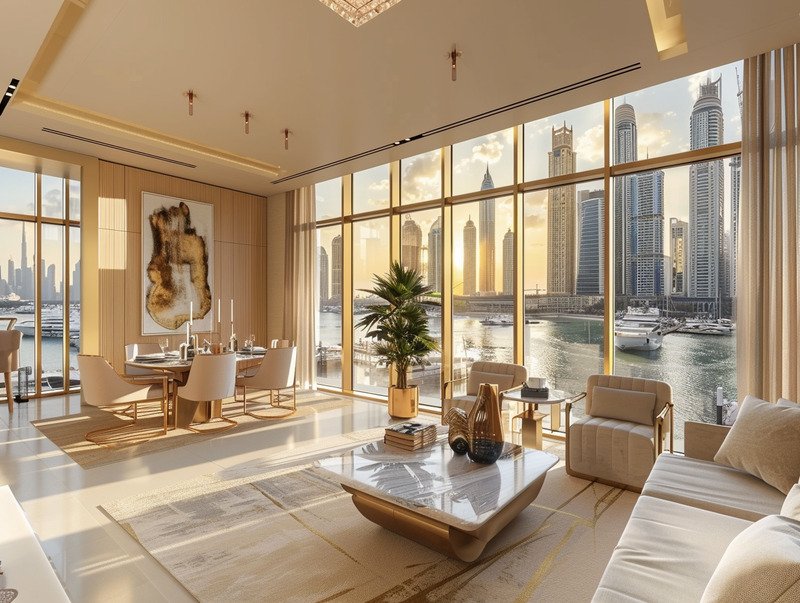
When purchasing property in Dubai as an NRI, ensure you have a valid passport and visa, and target designated freehold areas. Obtain a No Objection Certificate and verify the seller's title deed with a reputable agent.
Consider financing options like Dubai mortgages or personal loans from India. Note the absence of property and capital gains taxes in Dubai but be mindful of VAT on some services and a 4% property registration fee.
Preferred locations include Downtown Dubai and Palm Jumeirah for luxury, or emerging areas like Dubai South. Keeping abreast of market trends and infrastructure development will enhance your investment strategy, leading to greater insights.
Legal Requirements
To purchase property in Dubai as a non-resident Indian, you'll need to understand and comply with several legal requirements. First, you must provide a valid passport and visa. Although a residency visa isn't mandatory, you do need a valid entry visa.
Let us help you find the perfect property. Contact us to get started.
Next, you should be aware of the specific areas where foreigners can acquire property. Dubai has designated freehold areas where non-residents are permitted to buy, own, and sell properties.
You'll also need to obtain a No Objection Certificate (NOC) from the Dubai Land Department. This document guarantees that there are no legal impediments to the sale. Additionally, the seller must provide a title deed, which you should verify for authenticity.
It's essential to hire a reputable real estate agent who understands the local market and legal landscape. Moreover, the transaction should be conducted in the presence of a registered conveyancer or a lawyer, who'll ensure that all legal formalities are accurately handled.
Financing Options
When purchasing property in Dubai as a non-resident Indian, you'll find several financing options available to suit your needs. One of the most common methods is securing a mortgage from banks in Dubai. Many local banks offer home loans specifically tailored for non-residents, with competitive interest rates and flexible repayment terms. You can typically borrow up to 75% of the property's value, but this can vary depending on the bank and your financial profile.
Another option is obtaining a personal loan from banks in India. This can be a viable route if you prefer dealing with a financial institution you're already familiar with. However, personal loans usually come with higher interest rates compared to home mortgages.
You might also consider developer financing. Some property developers in Dubai offer financing plans directly to buyers. These plans often include attractive terms such as lower down payments and extended repayment periods. It's crucial to thoroughly review the terms and conditions, ensuring they align with your financial capabilities.
Lastly, self-financing through personal savings or investments is another option to explore. This approach allows you to avoid interest charges, but it requires substantial upfront capital.
Tax Implications
Understanding the tax implications is essential when purchasing property in Dubai as a non-resident Indian. Dubai offers a favorable tax environment, which is one of its main attractions. For starters, there's no property tax, income tax, or capital gains tax in Dubai. This means that you won't need to worry about annual property taxes or taxes on rental income, allowing you to keep more of your earnings.
However, you should be mindful of VAT (Value Added Tax). While it's not directly applied to residential property sales, VAT at a rate of 5% may apply to any services involved in the property transaction, like agent fees or property management services. Additionally, there's a one-time property registration fee of 4% of the property's purchase price, which you'll need to budget for.
On the Indian side, you'll need to take into account the taxation rules applicable to overseas income. Rental income from a Dubai property may be subject to taxation in India, depending on your total income and tax residency status.
It's advisable to consult a tax professional who can provide personalized advice based on your specific situation, ensuring compliance with both UAE and Indian tax regulations.
Location Preferences
Choosing the right location is vital when purchasing property in Dubai as a non-resident Indian. Dubai offers a variety of neighborhoods, each with unique characteristics that might cater to different preferences and needs.
If you prioritize proximity to business hubs, consider areas like Downtown Dubai or Business Bay. These locations are close to commercial centers, making them ideal for professionals who want to minimize commute times.
For those who value a luxurious lifestyle with waterfront views, areas such as Dubai Marina or Palm Jumeirah could be appealing. These neighborhoods offer high-end amenities, scenic views, and a vibrant community atmosphere.
Families might prefer more residential areas like Jumeirah or Arabian Ranches, which offer a quieter environment, good schools, and recreational facilities.
Additionally, emerging areas like Dubai South or Al Furjan provide opportunities for those looking to invest in up-and-coming neighborhoods with potential for future growth. These areas often offer more affordable options compared to established locales.
When considering the location, it's vital to think about your long-term plans and lifestyle needs. Proximity to essentials like schools, hospitals, and public transport can greatly impact your daily life and overall satisfaction with your property investment.
Market Trends
As you explore different locations, staying informed about current market trends that may affect your property investment in Dubai is crucial. The real estate market in Dubai is dynamic, with trends often shifting due to various economic, political, and social factors.
One significant trend is the growing demand for luxury properties, fueled by international investors seeking high returns. This demand has resulted in price growth in prime areas like Downtown Dubai and Palm Jumeirah.
Another pivotal trend is the focus on sustainable and intelligent homes. Developers are increasingly integrating green technologies and smart home features to attract environmentally-conscious buyers. These properties often come with higher initial costs but can provide long-term savings and appeal to a growing market segment.
Furthermore, post-pandemic recovery has affected rental yields. As tourism rebounds and expatriates return, rental demand has surged, making buy-to-let investments more profitable.
Nevertheless, keeping an eye on regulatory changes is vital, as the government regularly updates property laws to uphold market stability.
Property Types
When buying property in Dubai, you'll encounter a variety of property types, each catering to different needs and preferences. The most common categories are apartments, villas, and townhouses.
Apartments are widely available and range from studio units to multi-bedroom penthouses. They're often located in high-rise buildings within bustling districts like Downtown Dubai and Dubai Marina, providing amenities like swimming pools, gyms, and security services.
Villas, on the other hand, offer more space and privacy. These are usually found in gated communities such as Arabian Ranches and Palm Jumeirah. They come with private gardens, pools, and sometimes beachfront access, making them ideal for families seeking a more secluded lifestyle.
Townhouses strike a balance between apartments and villas. They offer multiple floors of living space and shared amenities within smaller communities. You'll find these in areas like Jumeirah Village Circle and Dubai Hills Estate.
Additionally, there are commercial properties including office spaces and retail units, which are ideal if you're planning to invest in business ventures. Each property type offers distinct advantages, so consider your lifestyle and investment goals when making a choice.
Return on Investment
Your potential return on investment (ROI) in Dubai’s real estate market can be remarkably high, thanks to the city’s robust demand and lucrative rental yields. Dubai’s strategic location as a global business hub and its high quality of life attract a steady influx of expatriates and tourists, driving up property demand. This demand guarantees that rental properties can command premium prices, translating into substantial rental income for investors like yourself. Another factor contributing to the high ROI in the Dubai real estate market is the availability of luxury properties in Dubai Hills Estate. These upscale properties offer modern amenities, stunning views, and a prestigious address, making them highly desirable for both long-term residents and short-term visitors. As a result, investing in luxury properties in Dubai Hills Estate can potentially yield even greater returns, making it an attractive option for savvy real estate investors.
In addition, Dubai offers one of the highest rental yields globally, averaging between 5% to 9% annually, which is considerably higher than many other major cities. This high rental yield is complemented by a favorable tax environment; Dubai imposes no property taxes or capital gains taxes, allowing you to retain a larger portion of your earnings.
Moreover, the city's continuous infrastructure development and economic diversification efforts further enhance property values. Projects such as the Dubai Expo 2020 site and various luxury developments are set to boost property prices, offering the potential for notable capital appreciation.
Conclusion
When considering buying property in Dubai as a non-resident Indian, it's important to understand the legal requirements, explore various financing options, and be aware of the tax implications.
Additionally, selecting the right location based on market trends and understanding different property types can greatly impact your return on investment.
With thorough research and careful planning, you can make an informed decision that aligns with your financial goals and personal preferences.
Let us help you find the perfect property. Contact us to get started.


